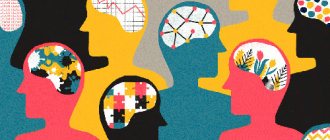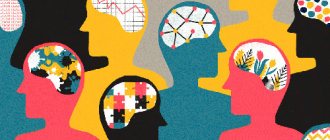Mental health is not simply the absence of mental illness or deviations from accepted norms. Experts identify Silvana Galderisi, Andreas Heinz, Marianne Kastrup, Julian Beezhold, and Norman Sartorius. Toward a new definition of mental health / World Psychiatry a healthy psyche as “a dynamic state of internal balance that allows people to use their abilities in harmony with the universal values of society.”
Let's figure out what signs show that a person successfully maintains internal balance, and how to restore lost harmony.
Ability to stay active
Our distant ancestors in primitive society could not afford a passive lifestyle - they simply would not have survived.
Therefore, evolution has adapted our bodies for constant physical and mental activity—both of which are critical to our overall health. “Withdrawal,” isolation, and passivity are common symptoms in mental disorders (especially depression). Any activity (walks in nature and hiking, socialization, sports and creativity) in turn helps to fight these phenomena, experience positive emotions and not withdraw into oneself.
You accept yourself as you are
© mimagephotography
A mentally healthy person fully accepts himself. He is at peace with himself and knows who he is.
Such a person does not try to please everyone and is not constantly looking for approval.
from others. This is the main characteristic of a sound mind.
Lack of self-acceptance is common in people prone to stress, anxiety and various types of mental illness.
They are concerned about their own appearance, clothing style, grades, attitude of others, salary
and many others. They are constantly worried about what others will think of them and often look for approval from other people.
Ability to cope with negativity
Our psyche is structured in such a way that dangers and negative phenomena attract our attention more strongly than joyful and pleasant events. This was justified in a world full of dangers, and helped our ancestors survive.
Nevertheless, properly functioning defense mechanisms of a healthy psyche help to switch attention from unpleasant thoughts to joyful ones. For example, humor is one of the most powerful protective tools. Thanks to it, you can redirect accumulated negative emotions into a more positive and constructive direction.
Mindfulness practice and meditation may also be helpful. These techniques allow us to look differently at situations that spoil our mood, and understand that in fact everything is not so bad.
You can control your reaction to emotions
Life is full of ups and downs and you can't control everything. There is no point in holding onto grudges, acting aggressively, or hiding from others out of fear and anxiety.
. A mentally healthy person understands this very well.
He will not waste his time trying to control things that are beyond his control. Instead, he will work on how to respond to his feelings and take positive action when he experiences negative emotions such as aggression or jealousy.
These qualities of a mentally healthy person will help him recover faster and rise, even when he has fallen to the very bottom.
People with no common sense live the illusion of a perfect life
, which does not exist. In moments of disappointment, they are overwhelmed by negative emotions. They don't learn from mistakes, let go, and move on like a mentally healthy person would.
Having close friends
Strong social connections are scientifically proven to be absolutely essential for good mental health. On the contrary, loneliness significantly increases the risk of developing various mental diseases.
Of course, we are talking about positive communication with others. Meanwhile, negative communication (aggression, bullying, ridicule) can cause great harm to our psyche. That’s why it’s so important to avoid “toxic” people and have more frequent contact with those who support us and give us joy.
You have a harmonious, satisfying relationship
Psychiatrist Robert Waldinger
(Robert Waldinger) conducted one of the longest studies and found out what makes a person healthy and happy.
Data collected over 80 years showed interesting results: good relationships are the source of happiness and health
.
Maintaining satisfying personal relationships is one of the clearest indicators of a mentally healthy person. At the same time, the quality of relationships is much more important than the number of friends and relatives
that you have. Strong social connections and deep attachments to loved ones make you physically healthier, happier and increase your life expectancy.
Mentally ill people are often in high-conflict marriages, unhappy relationships, and cannot count on anyone during difficult times.
Physical pain is compounded by emotional pain and early cognitive decline occurs. At the same time, healthy, warm and close relationships protect against many blows of fate and early aging
.
Correct functioning of the main mental functions
Executive functions, social reasoning, and motivational processes—these core human mental functions are critical to our mental health. The executive functions of our brain are responsible for attention, self-organization, planning and multitasking.
Social thinking allows us to determine the emotions of other people by their facial expressions and body language, understand their actions and correctly understand our role in relationships.
Motivation can manifest itself in different forms - the desire for knowledge or self-improvement, the search for new friends or partners. All these mental functions can be developed and trained to one degree or another.
The psychological state is as important as the physical one. This is the basis for satisfaction with life and yourself.
Such health shows the personality in general. It intersects with the sphere of motivations and emotions.
Psychological health criteria
The main criteria for psychological health include:
- adequacy of understanding of society;
- awareness of actions;
- performance and activity;
- striving for new goals;
- ability to find contacts;
- normal family life;
- feeling of attachment to family;
- responsibility;
- the ability to draw up a life plan and follow it;
- focus on personal development;
- integrity.
And sociopathy, psychopathy, neuroticism - all this is beyond the limits of such health. Deviations include individuals with the main set of internal problems:
- alcoholism;
- aggression;
- depressive states;
- sick attachments;
- victim position;
- fears, psychotraumas.
These are people with constant feelings of guilt. A person with psychological problems is not distinguished by prudence, he is hostile, and is unable to protect himself from life’s blows.
Mental and psychological health. Main differences
We rarely think about what the word “health” means. For some, it is the absence of body diseases or terrible diseases. But this concept includes not only excellent health or physical condition, but also emotional and psychological well-being. This is a type of interaction with the outside world in which a person feels happiness and satisfaction. This is harmony inside and outside, a balance that gives a chance to live normally. It is important to distinguish psychological health from mental well-being.
Mental health is the stability of the psyche, which allows the individual to remain adequate in society. Inappropriate behavior indicates illness and mental disorders. In other words, psychological and mental state are different concepts that are not complemented by one another. With an absolutely healthy psyche, people feel internal long-term discomfort, apathy, hostility, and depression. But cheerful people who are always in a great mood are sometimes mentally abnormal.
Mental and psychological health are two non-overlapping conditions. It is important to differentiate between them and recognize the differences.
So, psychological health is the well-being of the individual, adaptability, and a tendency to act rather than worry. This also includes an excellent mood, acceptance of oneself and others, creativity, responsibility, independence, etc. On the other hand, there are destructive manifestations of personality that interfere with pleasant emotions; they make a person feel general dissatisfaction, resentment, and guilt.
If a person is psychologically unhealthy, then he acts according to familiar patterns, does not want to change something, and incorrectly perceives failures and successes.
But one should not assume that psychological well-being and positive character traits are the same thing, since the norms for positive traits in societies around the world differ. This is not an example of an ideal personality, but a desire for oneself and for others. A psychologically healthy person understands what is happening to him and feels integrity. It turns out that such a person does not consider others a threat to himself.
Psychological health according to Maslow
According to Maslow's theory, psychological health does not simply fill the individual with a subjective sense of well-being, but is true in itself. In this sense, it is above the disease. It is not just better, it is true, because a healthy person can see more of the truth. The lack of such health not only depresses the individual, it is a kind of blindness, a pathology of thought.
There are few completely healthy people, but they do exist. If a person desires this, tries to achieve absolute health, then this is a real goal. It is better to live in a healthy, adequate, trusting society than in hostility and inadequacy. This is important for each of us. It is necessary to strive to comprehend psychological health, balance of spirit and body.
The fact that people are healthy and that they exist (albeit in small numbers) inspires faith and hope, the desire to strive for more, to grow as a person. Such faith in the capabilities of the human soul and nature pushes us to build a healthy society.
The desire for absolute health of soul and body is a normal phenomenon for a harmonious personality. Special techniques will help achieve this goal.
Just as we look after our own body, it is important to look after our mental state. In order to achieve physical health, we adhere to a healthy lifestyle, play sports, watch our diet, etc. To achieve health in a psychological sense, it will take work and work. This is self-understanding, self-education, the ability to make decisions, and identify other options for action. This is a readiness for something new, an effective use of one’s own resources.
Of course, in order to go in the right direction and develop, you first need to know your own personality, your own weaknesses, and resources. Special techniques that are aimed at studying personality, intelligence, and character help with this. All this will help build life prospects, rules that promote personal growth, help you realize your own capabilities and really evaluate your achievements.
Self acceptance
The ability to accept yourself is the key to good mental health. Conversely, self-dislike is a big risk factor for mental disorders. Self-acceptance includes two components: self-esteem and self-image. Self-esteem is our assessment of our own qualities. Self-image is the sum of all our ideas about ourselves.
Self-acceptance requires healthy self-esteem and an adequate self-image: we see all our important positive qualities and recognize our worth. People with low self-esteem (or an inadequate self-image) are more susceptible to mental disorders such as depression and anxiety. Exercises will help raise self-esteem - for example, keeping a diary of your achievements (even if they are “insignificant”).
Do you respect yourself
A mentally healthy person not only respects himself, but also his friends, family members and even strangers. He calmly communicates with people, even if he has a different opinion, outlook on life and perception of the world
.
Such people value, respect, accept and love themselves, and, moreover, they understand how important it is to respect and accept others for who they are.
.
Mentally unhealthy people not only do not respect themselves, but also others.
They are programmed to think negatively
, find faults in other people, often perceive other people's opinions as attacks if they do not coincide with their opinions, and behave disrespectfully towards others.
Adaptability
Life never stands still, and to maintain a healthy psyche it is important to be able to quickly adapt to unexpected changes. Lack of mental flexibility can lead to undesirable consequences and deterioration of the emotional state.
In turn, mental disorders often deprive us of the ability to adapt, as a result of which we lose motivation and begin to avoid life itself. A vicious circle arises that can be extremely difficult to break.
But difficult does not mean impossible. You can get out of a dead end with deliberate effort, gradually replacing unhealthy habits (for example, staying at home all the time) with more productive ones (for example, forcing yourself to go for walks or meet with friends).
You don't take things personally
A person who accepts and loves himself for who he is has much less anxiety. They do not take negativity and criticism to heart.
A person with a healthy psyche is optimistic and can easily laugh at shortcomings and at himself. He controls how to react to an event or his emotions.
A pessimist is not mentally healthy because he is never dissatisfied with himself. He projects his doubts and complexes onto other people. Even a stupid joke can hurt him deeply.
Organized
Even writing down a list of things to do every day creates positive feedback. Your mood will improve and it will give you a feeling of satisfaction, programming your brain to take further beneficial actions.
Self-discipline
is one of the common characteristics of a mentally healthy person, and
it is the key to success and happiness
.
At the same time, a mentally healthy person does not force himself to adhere to a regime and a certain order. Rather, it comes naturally to him and he likes it.
Organization allows a person to do what is important and necessary, even when he doesn’t really want to do something.
A mentally ill person finds it difficult to maintain self-discipline; he succumbs to laziness, procrastination, suffers from chronic indecision, helplessness and does not feel that he is in control of his life.
React appropriately to failures
Psychological stability
- one of the main characteristics of a mentally healthy person. Disappointments are sometimes inevitable, no matter how hard we try to avoid them or plan for them. A mentally resilient person knows that life has ups and downs, and he is prepared to face rejection and failure.
He can adapt to any kind of situations and environment. Possessing resilience and flexibility, such a person accepts any rejection with dignity, learns from mistakes and moves on.
. With each refusal, he grows psychologically and becomes stronger.
People who are psychologically unhealthy do not know how to cope with their emotions and take care of themselves. They take any refusal to heart and become emotionally weaker.
So, how many signs of a mentally healthy person have you found in yourself?







